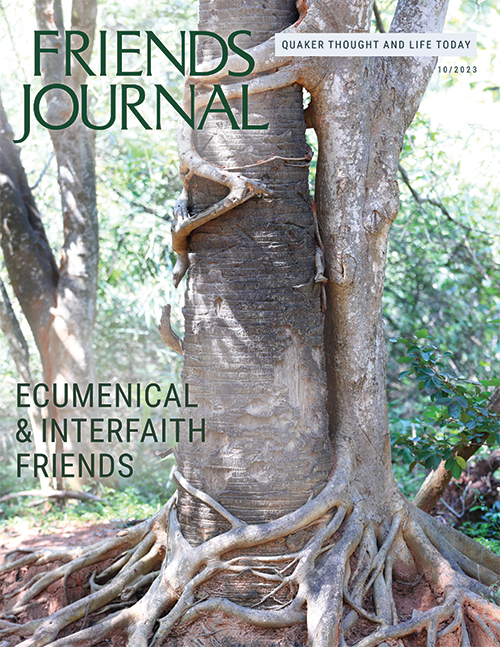Thoughts on Quaker Process
There are those who would say that Quaker leadership is an oxymoron.
When I moved to Washington, D.C., I began to attend Friends Meeting of Washington, D.C. (FMW), where I noticed a leadership structure of sorts, but most of the rules seemed unspoken and sometimes loosely applied. At that time, the clerk of the meeting was an older woman who spoke softly and conducted meetings for worship for business in a fluid, open manner, but all the tasks were done. I became a member of the meeting and participated in committees and meetings for business. I analyzed the process and assumed I understood the system.
That’s what lawyers do: analyze systems and see how they work. I was aware of different kinds of leadership and decision making. I knew Robert’s Rules of Order. I was also active in movement work, so I understood consensus decision making in a secular setting. But at FMW, Friends spoke of “the sense of the meeting,” which I understood was to be arrived at through consensus. But there I was dead wrong, and this is how I found out how wrong I was.

A friend of mine who was part of a women’s chorus asked me for a favor. The chorus was in a fierce dispute over whether they should all wear pants or skirts for performances or let the members choose individually. Trying to reach consensus, they were in absolute deadlock. “You are a Quaker,” she said, “so you understand consensus. Would you come to our next meeting and help us get over this impasse?”
I replied that I was a new Quaker and didn’t feel qualified, but I would ask the clerk, a “weighty Friend” (as some Friends would say), if she would come. When I approached her, she looked surprised. “I don’t really understand consensus, since Friends seek a sense of the meeting guided by the Spirit, but if you think I could be helpful, I will go with you.”
So we went to the meeting of chorus members. First the clerk explained that Quakers seek a sense of the meeting, which is similar to but not the same as consensus in that it relies on a spiritual process characterized by deep listening and God’s guidance. Then she shared her understanding of the Quaker process: Each member first commits to come to decision making with an open heart and mind and a willingness to listen. Next, everyone is given an opportunity to speak on what direction the group should take. And finally, she added, the most important thing is to trust the process and not cling to your vision of what should happen. There’s no honor in blocking a final decision to get your way. Friends believe that “standing aside”—not changing your position but letting the group move forward—is a valuable tool.
When she finished speaking, we chatted a bit and left the chorus members to their business.
I found out later that everyone admitted that none of them were willing to take that approach, that it was too great a sacrifice to give up their preferences, and, not being able to resolve their dispute, the chorus broke up. If the members of a community place their individual needs and wants above that of the group, the result may mean the end of that community. This outcome could be true whether or not Spirit is consulted during the process.
As I continued my involvement in FMW, I learned more lessons on Spirit-led guidance from Friends. These were shorter but still valuable. In the middle of a meeting for business discussing the effectiveness of various options, an older Friend rose to say, “You are not the clerk of the results committee. God is.” And then she sat down. I often think of that wisdom when Friends are more concerned about costs than about faithfulness, such as trading with Amazon or other inexpensive options, regardless of their questionable practices.
Sometime later, the meeting was in conflict about when marriages qualified to be under our care. A Friend who had moved a thousand miles away from Washington and only attended his local meeting rarely asked to be married under the care of FMW. I questioned whether it would be appropriate for the meeting to agree given his tenuous connection to Friends and to our meeting in particular; to me, agreeing would render the words “under our care” meaningless. I was alone in my concern but clear about it. The matter was held over for a month.
In the meantime, I met with the Marriage and Family Committee, which seemed clear that long-distance care was possible. By the next meeting for business, my concern was still present. An older Friend said, “J.E., I know it is hard to stand aside when you are clear, but the meeting is also clear. Can you not stand aside and trust the meeting? I have stood aside with doubts a number of times and can tell you it doesn’t really hurt.” I stood aside.
Conflict deepened at FMW over same-gender unions. It was discussed month after month, with many Friends weighing in. Feelings were raw. Some felt they were being asked to betray their beliefs, and others felt they were not being treated as equal members of the meeting. But as months crawled on, the meeting did too. There was no blinding light or crashing cymbals. Many Friends had not moved an inch in their beliefs, but the meeting as a whole (I cannot describe it any other way) moved on and began to heal.
There’s a common saying: “Lead; follow; or get out of the way.” Quaker process is precisely how we lead; follow; or get out of the way, making space for the Light to guide us. That is the true secret of Quaker decision making. We Friends talk and listen in the silence and to each other and analyze and create. But ultimately the Light leads: not always easy to follow, sometimes hard to see and understand, but invariably guiding us in the right direction.




Comments on Friendsjournal.org may be used in the Forum of the print magazine and may be edited for length and clarity.